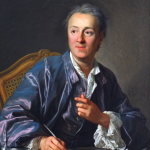Humanism does not require the death of God.
All it requires is the affirmation of human freedom.
William R. Jones
ONE OF THOSE VICIOUS CIRCLES
The French philosopher Denis Diderot, an Enlightenment era humanist, gets my vote for the most succinct summary of the connection between government, religion, and oppression: “People will never be free until the last king is strangled with the entrails of the last priest.”
Thomas Jefferson, another who spoke of violent revolution, called Diderot “among the most virtuous of men.” There’s no record that Gandhi approved of Diderot’s graphic fantasy. And, as a pacifist myself, I don’t condone violence of any kind, at any time.
Still—at least metaphorically—Diderot’s sentiment summarizes the classic humanist stance: the unholy relationship of government and religion hinders human freedom and human development. Why? Because any religion necessarily has a program; an agenda—an agenda most likely resting on unexamined prejudices. And those prejudices most likely benefit those in power. It’s one of those vicious circles, ya know.
(Keep in mind that even among oppressed groups there are those in power and those not in power.)
Take even a seemingly innocuous theological stance, such as “God is love.” First off, what does that make hate? A thing of the people? Of some demonic force? Why does hate often (usually?) win?
Secondly, consider what this means for the oppressed and the poor: why does god’s love extend at best only provisionally to them? Why does god’s love, out of the billions of people on our planet, extend to so few?
What is the connection between god’s love and material well-being?
Why does god’s love fall on particular places on the planet?
Can I somehow be so egotistical as to think that human suffering exists merely so that I may fix it?
Diderot had something to say about that as well: “Watch out for the fellow who talks about putting things in order! Putting things in order always means getting other people under your control.”
African American liberation theologian—and sometime Unitarian Universalist minister—William R. Jones had a thing or two to say about that in his groundbreaking book “Is God a White Racist: A Preamble to Black Theology,” which appeared back in 1973.
BEYOND PRIVILEGE—RIGHT, WHITE, OR OTHERWISE
The “god is love” example is a fairly benign theology, when compared with, oh, say ISIS or the prosperity gospel. And what about those theologies that place god’s imprimatur upon the actions of particular nations or tribes or sects? We know the outcome: bloodbaths.
You and me and Diderot may be beginning to perceive a pattern here . . .
Liberation theologies have a common theme: they ask us to see the reality beneath the appearance. William R. Jones changed the conversation in African American theology by pointing out the elephant in the room: black suffering is not redemptive. It’s suffering. And suffering is a bad thing.
The same is true in feminist theology. Queer theology. Any theology worth its salt: human suffering is a bad thing. Human suffering needs to stop. Human suffering is the evil in the world and it is done by . . . human beings.
Humanism is an evidence-based ethical tradition dedicated to improving the human condition. Nothing supernatural. Nothing offensive to the heart or mind.
Humanism is about facing the human condition without superstition. From this vantage point we can see that national borders do not demarcate human dignity or human rights.
We can see that the perceived differences among human beings—gender, religion, ability, race, social status, nationality, what-have-you—make no difference in our commitment to treating a person with dignity and contributing to each person’s flourishing upon this earth—that “inherent worth and dignity” thing.
From the humanist perspective, no god “sheds his grace on thee” . . . or thee or . . . that thee over there. We each are responsible to the other for shedding what grace we can.
KEEPING OURSELVES TO OURSELVES, FRIENDS
No. I don’t have any dreams of strangling the last king with the entrails of the last priest. Or visa-versa. I have no god to condone or compel me to such violence.
Nor do we live upon a planet where superstition will be eradicated.
Still, those who can do that work metaphorically—in our own minds—can see that human and planetary flourishing are possible.
Here’s the truth: It’s just us, friends. It’s just us. That’s it. That’s the show. Over and out.
That’s the justice that humanists are committed to. Arguments for the social good only break out of illusion when we get outside ourselves. And the only way to get from selfishness to compassion is through reason combined with compassion.
Because—let’s fact it—many things that are good for society or the earth itself are not good for many individuals. And often not beneficial to those already privileged.
Higher taxes. Affirmative action. A livable minimum wage—these cost some people, benefit others. Fair trade costs. Carbon cap-and-trade restricts the rights of some.
Just policing and a just justice system won’t be easy. Nor do they benefit everyone. They do, however, benefit most.
We can live in delusion and believe that god is love and say (and even feel) that we are in solidarity with all “those other people”—then do nothing—or we can get out there and break down White Privilege. And American Privilege. And Human Privilege, come to that.
The way there is, as it always has been, reason and compassion.
No, it’s neither reasonable nor compassionate to strangle monarchs nor to disembowel priests. That’s their game, friends—that strangling and disemboweling thing. Let’s be the change we wish to see in the world . . . reasonably and compassionately.











